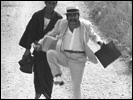The Homeless
- Year
- 1974
- Original title
- Yadonashi
- Japanese title
- 無宿
- Director
- Cast
- Running time
- 97 minutes
- Published
- 27 May 2007

by Tom Mes
When the Daiei studio closed its doors in 1971, their biggest chanbara star Shintaro Katsu already had his own production company Katsu Production set up, and a distribution deal signed with Toho. With most directors and actors now liberated from their long-term contracts with the ailing major studios, and film work harder to come by, Katsu was able to pick and choose from a teeming pool of talent and lined up a series of high-profile projects. He cast Toshiro Mifune and Ayako Wakao to co-star with him in Zatoichi Meets Yojimbo (directed by Kihachi Okamoto in 1970), paired his brother Tomisaburo Wakayama with his favourite Daiei director Kenji Misumi for the Baby Cart / Lone Wolf and Cub series (Kozure Okami, 1972-'74), and lured Ken Takakura and Meiko Kaji into his fold for The Homeless, a loose remake of French director Robert Enrico's Les Aventuriers (1967).
The Homeless is a picaresque tale in the truest sense of the word. Two inmates are simultaneously released from jail, but go their separate ways, only to cross paths again in the nearest brothel. There they make the acquaintance of a would-be prostitute with a childlike mind and serious problems with the yakuza. They help her escape from the mob-infested cathouse and decide to guide her on her quest for sunken contraband somewhere off the coast, whose location only she knows, but which the yakuza are very eager to learn about.
What follows is a good-natured take on a perilous journey, through some exquisitely photographed countryside location - director Saito was a former photographer and cameraman, hand-picked by Katsu on the basis of his direction on the previous year's Tsugaru Folk Song (Tsugaru Jongara Bushi), a critically-lauded Art Theatre Guild production with an equally lush rural setting. Takakura and Katsu may have found their parts tailor-made for their popular image - one the stoic loner, the other the scruffy but loveable ne'er-do-well (their roles in the more comical original film were played by Alain Delon and Lino Ventura, respectively) - Meiko Kaji plays completely against type as the simple-minded hooker. Carried on Katsu's broad back, running away from the waves that crash on the beach, or scurrying out of sight of gangsters: in the space of a single film, she effortlessly shakes off the dark avenger persona that stuck to her after four episodes of Female Convict Scorpion and two outings as Lady Snowblood.
What hadn't changed was Kaji's refusal to do nudity. The Homeless was a watershed of sorts for the actress, who made a clear decision to turn a page: she began to pick her projects with more care, choosing quality over quantity. She changed management, shifting from major talent agency Hori Pro to an independent manager who had previously shepherded the aforementioned Ayako Wakao. In short, she intended to leave the exploitation arena well behind her. The last thing Kaji must have wanted at this point was to disrobe on command. Director Saito managed to get around the problem, though none too subtly: he had to film a shot of Kaji skinny-dipping in the sea from a great distance - the top of a neighbouring cliff - then used an obvious body double to sneak in a nude shot.
Despite all the star power and gorgeous scenery on display, The Homeless was a commercial failure upon its theatrical release that effectively brought an end to the era of stars producing their own films. Shrinking box office potential no longer allowed for the kind of all-star casting that Katsu Production gambled its fortunes on. Audiences could stay home to see their movie stars at work, since these were now appearing en masse in television serials. The Homeless would be Katsu's last big screen production for a while, until the belated closing chapter in the Zatoichi series in 1989.
Katsu and Takakura's individual reputations suffered little from the film's commercial failure, but Kaji continued her career mostly on the small screen. She only returned to movies off and on, working with directors of magnitude including Yasuzo Masumura, Kinji Fukasaku, Kon Ichikawa, and Kaneto Shindo. That most of these outings were in supporting roles confirmed that Meiko Kaji was no longer considered star material, at least not when she wasn't slicing and dicing male flesh. Had The Homeless been a box office hit, it would have doubtlessly aided the public and industry to regard her as an actress instead of an outlaw.